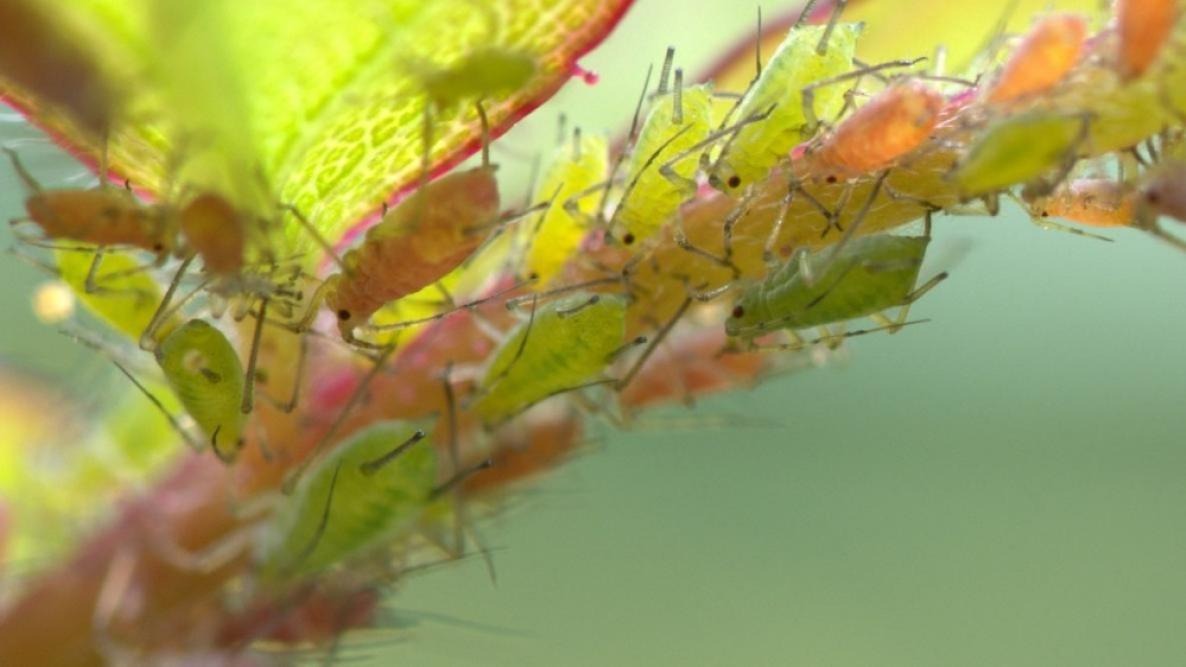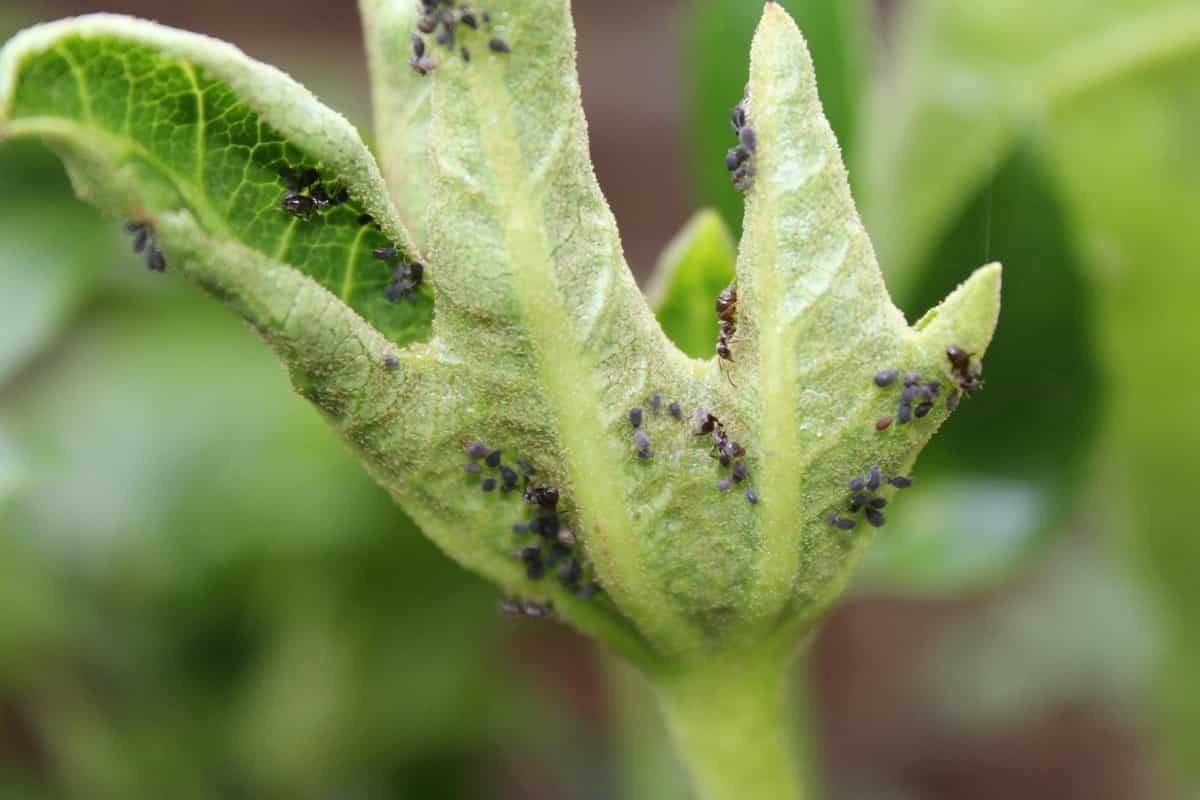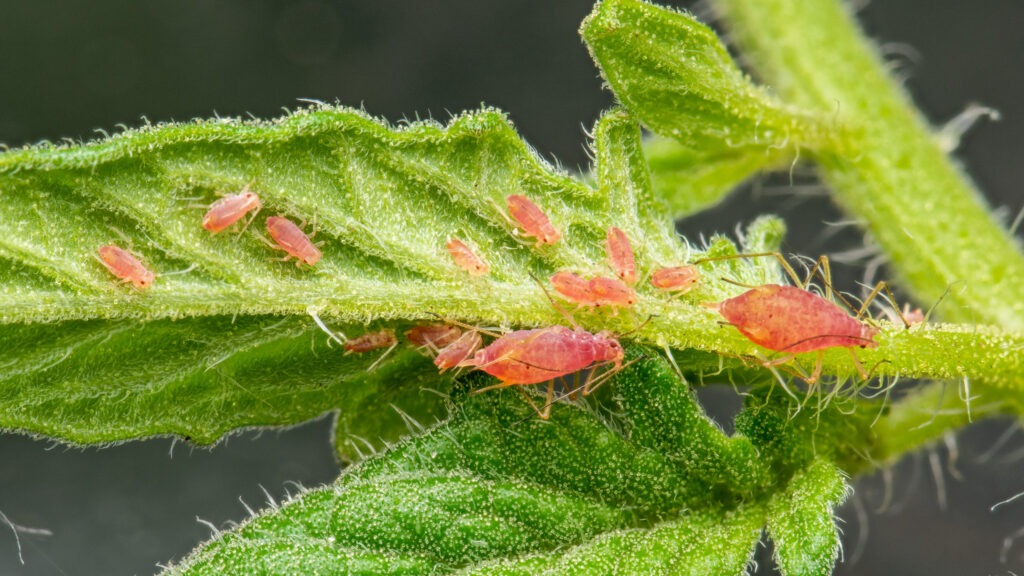Aphids are tiny sap-sucking insects that can inflict significant damage to your garden if left unattended. These notorious garden pests reproduce quickly and can wreak havoc on plants by feeding on their sap, causing leaves to curl, turn yellow or even fall prematurely. However, with the right strategies and the right knowledge, the management of aphids can become a manageable task.
In this comprehensive guide, we will look at simple and effective ways to protect your garden from aphid infestations.
Identification of aphids
To effectively manage aphids, it is essential to be able to identify them accurately. Aphids present a remarkable range of colors, such as bright green, pale yellow, deep black or even soft pink. Their characteristic pear-shaped bodies are often misunderstood as small tear-like insects.
What distinguishes aphids is their tendency to cluster mainly on the underside of the leaves and along the stems of plants. These parasites possess a surprising ability to reproduce both venereal and venereal, which means that their populations can skyrocket in a matter of weeks.
Natural predators
Harnessing the power of natural predators is one of the most environmentally friendly and effective ways to action aphids in your garden. Among the aphid control samples are ladybugs, laces
These beneficial insects have a voracious appetite for aphids, which makes them invaluable allies in your pest control efforts. To attract these beneficial insects to your garden, consider planting nectar-rich flowers such as marigolds, dill and fennel. These flowers not only provide food, but also a habitat for these aphid-eating warriors, ensuring that they stay and protect your garden.

Here are some natural predators of aphids:
Ladybirds(ladybirds): Ladybirds are perhaps the most well-known aphid predators. The larvae and matures of ladybirds feed on aphids. A single mature ladybug can consume dozens of aphids in a day, which makes them valuable allies in the control of aphids.
Lacewings: Lacewings, especially green lacewings that lace up Their larvae, often called “aphid lions” because of their fierce appetite, feed on a variety of garden pests, including aphids.
Parasitic wasps: Some parasitic wasps lay their eggs inside aphids. When the wasp larvae hatch, they consume the aphids from the inside, finish them. This natural parasitism can help keep aphid populations under control.
Hoverflies(hoverflies): Hoverflies resemble bees, but are harmless and feed on nectar. Their larvae, however, are excellent predators of aphids. Hoverfly larvae actively hunt and consume aphids, which makes them valuable for biological pest control.
Predatory beetles: Several species of beetles, such as the aphid midge and the soldier beetle, feed on aphids. They can be effective in reducing the number of aphids when they are present in your garden.
Birds: Some bird species, including sparrows, wrens and finches, include aphids in their diet. Attracting birds to your garden by providing birdhouses, bird feeders and bird baths can help control aphid populations naturally.
Praying mantises: Although they are more generalist predators, praying mantises easily consume aphids when they have the opportunity. They can serve as beneficial insects in the ecosystem of your garden.
Spiders: Some species of spiders, such as crab spiders and weaver spiders, catch aphids in their webs and use them as a food source. These spiders can contribute to the control of aphids in your garden.
Ground beetles: Ground beetles are nocturnal predators that feed on a variety of garden pests, including aphids. Providing suitable habitats for ground beetles, such as mulch or ground cover, can encourage their presence.
Predatory insects: Insects such as the big-eyed insect and the damselfly insect are natural predators of aphids. They pierce aphids with their pointed mouthparts and feed on their body fluids.

Planting Companion
Companion planting, an age-old gardening technique, can be a strategic ally in your arsenal of aphid control. Some plants emit strong odors that aphids find repulsive. By interspersing these herbs and vegetables with your sensitive plants, you create an olfactory barrier that discourages aphids from settling.
For example, the pungent aroma of garlic, chives and basil has a natural deterrent effect. Nasturtiums, on the other hand, act as sacrificial plants by attracting aphids. They divert the attention of these pests from your precious crops, effectively protecting your primary plantations.
Mechanical control
For smaller aphid infestations, the use of mechanical control methods can be both practical and effective. A powerful jet of water from a hose can remove aphids from plants and disrupt their colonies.
Pay special attention to the underside of the leaves, where aphids often hide. Repeat this process regularly if necessary to keep aphid populations under control. Alternatively, you can use a soft brush to gently scrub aphids from plant surfaces. Be careful and gentle to avoid damaging your plants when implementing this method.
Organic spray
In matters where the aphid population becomes overwhelming, organic insecticidal soaps or neem oil sprays can be effective solutions. These organic garden pest control products are less harmful to beneficial insects than chemical alternatives and can effectively action aphids.
To ensure success, carefully follow the instructions on the product label and apply the treatment during the cooler parts of the day to minimize the peril of damaging the plants. Always do a patch test on a small area first to make sure that your plants tolerate the treatment without adverse effects.

Here are some organic vaporizers:
Neem Oil: Neem oil is derived from the neem tree and is an effective organic pesticide. It disrupts the feeding and reproduction of aphids and acts as a repellent. Neem oil can also deter other garden pests and is safe for beneficial insects when used as directed.
Insecticidal soap: Insecticidal soaps consist of potassium salts of fatty acids. They work by breaking down the protective outer cover of aphids and other soft-bodied insects, causing them to dehydrate and pass away. Insecticidal soap is considered safe for humans, pets and beneficial insects when used correctly.
Horticultural oil: Horticultural oils, such as sleeping oil or summer oil, smother aphids and their eggs by coating them with a thin film of oil. These oils are usually applied when plants are dormant or during the growing season and can be an effective method to control aphids.
Pyrethrin-based sprays: Pyrethrin is a natural insecticide derived from chrysanthemum flowers. It quickly finish aphids and other pests on contact. Pyrethrin-based sprays have low toxicity to humans and pets and are biodegradable.
Garlic and pepper sprays: Homemade garlic and pepper sprays can be effective in repelling aphids. These sprays are made by mixing garlic cloves, chili peppers and water. The pungent smell and spicy nature of spra possono can discourage aphids from settling on plants.
Spra essential Oil: Some essential oils, such as peppermint, rosemary and thyme, have insect repellent properties. You can create a homemade essential oil spray Make sure you follow the correct dilution ratios to avoid damaging your plants.
Diatomaceous Earth: Although it is not a spra, diatomaceous earth is a fine and powdery substance made from the fossilized remains of diatoms. When sprayed on plants or around flower beds, it can be an effective body barrier against aphids and other crawling insects. Diatomaceous earth works by damaging the waxy coating of the insect’s exoskeleton, causing dehydration.
Homemade soap Spra Sapone: You can make your own organic soap Spra sp by mixing a few drops of mild liquid soap (such as Castile soap) with water. This creates a solution that can be sprayed on the aphids to disrupt their cell membranes and control their numbers.
